A group of then-teenage friends from Denmark, Iceage achieved international praise in 2011 with their debut album, New Brigade—a 24-minute collection of tight, urgent songs based in the hardcore tradition and recorded without overdubs. Iceage also became known for playing short concerts—not much longer than 20 minutes, the combined length of the band’s entire repertoire—and for the brutality of their shows and mosh pits. The band’s blog has displayed photos fans submitted of their injuries sustained at Iceage concerts. And then there was the group’s curious merchandise, like knives and locks of their hair.
As Iceage’s members—singer and guitarist Elias Bender Rønnenfelt, guitarist Johan Surrballe Wieth, bassist Jakob Tvilling Pless, and drummer Dan Kjær—entered their 20s, the group’s sound evolved, the songs became more expansive, and the merchandise more conventional. Starting with its third studio album, 2014’s Plowing into the Field of Love, Iceage began looking outside the confines of hardcore and post-punk, adding nonstandard instrumentation like viola, mandolin, piano, and trumpet—without losing its fierce edge.
On Iceage’s most recent album, Beyondless, the quartet continues to experiment by augmenting its core lineup with brass, woodwind, and string players, resulting in a compelling set of sonic tapestries. But that’s not to say that the guitar plays a subservient role—quite the contrary. From the blues-heavy riffs on “Catch It” to the fiery single-note lines on “Pain Killer,” Wieth and Rønnenfelt together build a massive wall of sound throughout the proceedings.
Premier Guitar recently chatted with Wieth and Rønnenfelt, who were open and thoughtful about their approaches to music-making. They revealed some unlikely influences, talked about the processes at work in Iceage, and spoke of the joys of analog recording. And, in what’s perhaps an unprecedented reveal for a PG interview, Rønnenfelt explained why he no longer owns a guitar.
You grew up in Copenhagen, Denmark, in the 1990s. What were your formative years like?
Johan Surrballe Wieth: I went to school with Dan, Iceage’s drummer. We became friends at the age of five, and our intro to music was Kiss. We were very obsessed with Kiss, though maybe we didn’t listen as much to the records as we collected the little figurines and T-shirts and posters and stuff. And then I started out with my dad’s record collection, which was quite respectable with albums by Jimi Hendrix and Iggy Pop and Lou Reed and all that stuff. I started on guitar at 11. I was actually supposed to play bass with a cool kid at school who needed a bass player. But after I played my mom’s guitar, I realized that the guitar was a much better fit for me than the bass.
Elias Bender Rønnenfelt: I didn’t have a lot of training in guitar, but when I got to the point where I had a few basic lessons that would lead me on the way, I found you could place your finger in places that the guitar teacher hadn’t told you, but that created valid chords. You could just move your fingers and discover there are certain combinations of notes on the guitar that make sense. Ever since I started playing, I’ve always been a big fan of using the open strings on the guitar. Maybe you just put down two fingers on the fretboard, move them around, and you just see what happens when the notes get mixed with the open strings.
You both seem to make the maximum of minimal materials on the guitar.
Wieth: Playing guitar was—and is—for me a very simple thing. I still haven’t really figured out the instrument. So every time I pick up a guitar, I’m still kind of confused as to what to do with it. And I think perhaps sometimes that comes out for better and for worse. Sometimes I’m fed up with it, but I always return to it. And yeah, I’m still very much learning exactly how to approach it and sometimes something very good comes out of that.
How often do such accidental discoveries happen?
Wieth: Oh, all the time. Actually, Nis [Bysted], the guy that produced our record, taught me very early on that when you’ve made a mistake, at first you go, “We have to do it over.” But then as you listen over and over to the mistake, you realize perhaps you should just go with it. It’s kind of like the John Coltrane thing: If you play a wrong note once, it’s a mistake. If you do it over and over again, it becomes a path. And I think that happens quite a lot on the record as well.
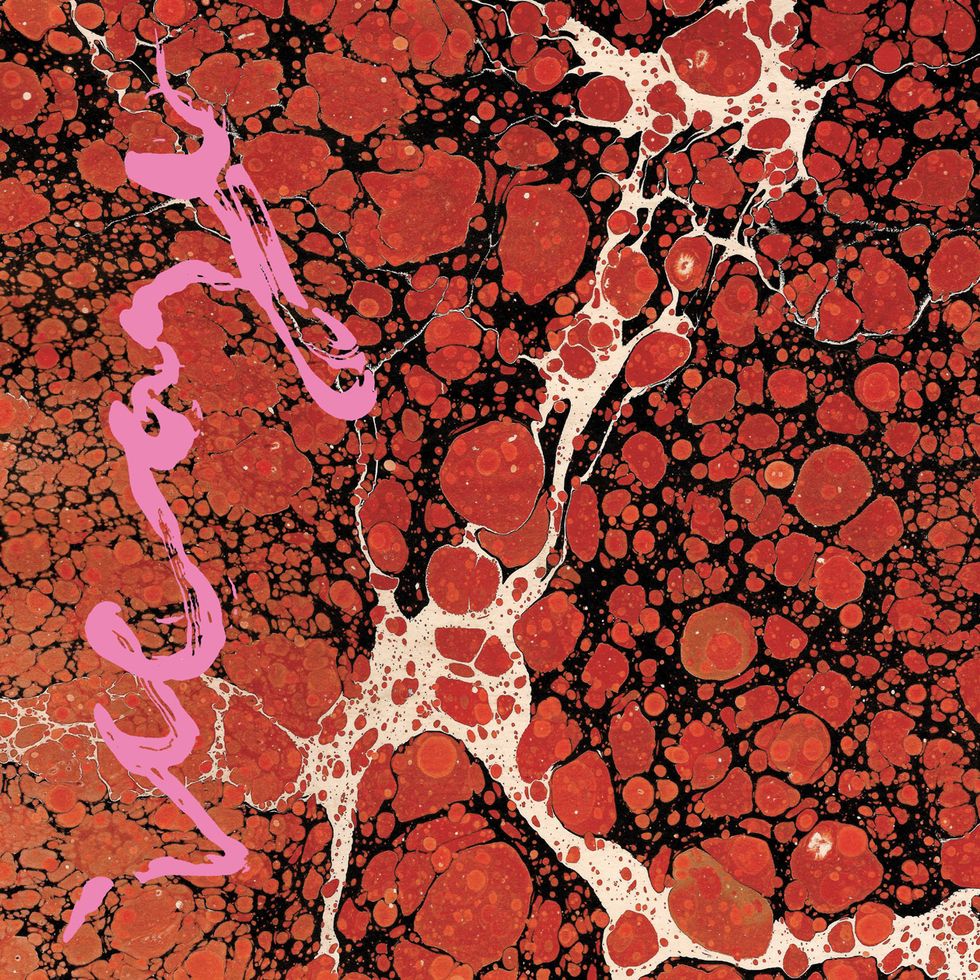
TIDBIT: Iceage recorded their fourth studio album, Beyondless, exclusively to tape using a vintage 16-track Ampex. “It just happened to be there,” says Wieth, “and it happened to really work for us.”
Speaking of Coltrane, what, if any, impact has jazz and improvised music in general had on the way you play guitar?
Wieth: Oh, a big impact. Because my technical knowledge is quite limited, improvising has always been kind of difficult for me, but I try anyway. I think it’s extremely important to improvise, especially if you’re playing something that seems old and you’ve overplayed it. Improvising can be a very big help to look at a piece from a different perspective. So improvising is definitely a big part of the way I play. And with our music and with the way I play, the urgency and the immediacy of being there in the exact moment is very important.
Rønnenfelt: Sometimes you can pick up a guitar and you’re looking for an idea and every set of notes you play feels banal and generic and like something you’ve played before. But then in a certain moment, you’ll pick up a guitar and you’ll find three notes or a set of spontaneous patterns you move your fingers in that, in that moment, feel significant. So you have to have some sort of mindset that’s right for you when you sit down. And sometimes that takes a great deal of slaving away on the guitar. And then some days, you just pick it up and straight away the first thing you play just screams of possibility.
Johan, how do you maintain that immediacy and urgency? Especially in the studio when there might be distractions, like the clock ticking.
Wieth: I think the clock ticking is an important thing. In fact, we always make sure to give ourselves not enough time. You always have the taste of blood in your mouth and your head is only one place. There are no distractions. There’s just the playing and nothing else. So time constraints are very much a way to keep urgency.
Acclaimed by many as Denmark’s greatest post-punk band, Iceage is (left to right) bassist Jakob Tvilling Pless, singer and guitarist Elias Bender Rønnenfelt, guitarist Johan Surrballe Wieth, and drummer Dan Kjær Nielsen. Photo by Steve Gullick
Is the band’s writing process collaborative?
Wieth: It is a collaborative thing, though we don’t sit together in a room and then start writing a song. Typically someone has a riff or a blueprint for an idea. And then when we’re in the rehearsal space, we feel out and expand how the song should be. But we never jam over a song. We don’t talk a lot—we’re not very verbal. The language we have is molded by 10 years of playing together. The way we play and write songs comes down to the fact that we learned how to play music together. It’s always been a collective process of learning, and that’s a very big part of the way we write music.
Rønnenfelt: I’m good at coming up with a blueprint for a riff. And then Johan is the one who breathes life into the riff and makes it become something more than just a blueprint. Johan is an extremely intelligent guitar player and is naturally expansive in his way of interpreting any riff or composition presented to him. He’ll instantly look for where he can take it. I’m sort of the rhythmical foundation for him to express himself upon. And I’m good at composition—I’m good at making up the basis of a riff—but he’s the one who projects the genius onto what’s there.
I understand that Beyondless is your first analog record.
Wieth: It’s our first fully analog record. We recorded it on a 16-track Ampex tape machine. People ask if we chose the studio for the specifics of that machine being there. But that’s actually not the case. It just happened to be there, and it happened to really work for us.
Rønnenfelt: I think the kind of music we make sounds better recorded on tape. Tape has a warmth to it. It has a depth to it. We weren’t really trying to emulate the sound of a certain era. We didn’t set out to make a ’70s classic-rock record.
Did you find that the analog format impacted the way the band played?
Wieth: No, not really. But I think it did a very practical thing. When you play into a computer, you can go on forever, but when you go to tape, at some point you have to change the reel. So every now and then, the engineer has to go, “Okay guys, you’ve got to take 20.” That helps keep things refreshed. But I don’t think that it actually affected the way we played. I doubt that would be possible.
Rønnenfelt: Tape gives you a certain set of limitations that is beneficial. Having endless possibilities is not something you necessarily want in a studio. As they say, you can find great freedom in restrictions.
What guitars did you use on Beyondless?
Wieth: For this record, I played my Fender Jaguar Thinline, a goldtop Gibson Les Paul, and a Bjärton hollowbody, which is actually kind of a weird one. Bjärton is a company started by a former Hagström employee, and the Bjärton I played is one we’ve used on all of our records. I also played a Fender 12-string Strat. But live, I always just play my Jaguar. I actually have three of them. The one that I’m playing right now is my baby. I waited for a very long time to be able to afford it. It’s the 50th-anniversary model with the mother-of-pearl inlays and everything. That’s my go-to.

Guitars
Bjärton hollowbody
Fender Jaguar Thinline
Fender 50th Anniversary Jaguar
Fender Stratocaster XII
1974 goldtop Gibson Les Paul
1960s Gibson Les Paul Junior
Amps
1970s Fender Twin Reverb
1970s Vox AC30
Effects
Mantic Proverb
ZVEX Distortron
Strings and Picks
Assorted Elixir string sets
Dunlop Tortex .88 mm picks
What is it about the Jaguar that feels like home?
Wieth: I don’t really know. People ask me often, “Why do you play that guitar?” It doesn’t quite make sense, because taming it—especially the thinline version—can be quite a struggle. It’s kind of like I’m always battling the Jaguar. I’ve played many guitars that I liked a lot and dreamed about, but for some reason, I’ve always just been most attracted to the Jaguar. I can’t really explain it.
Elias, what do you play?
Rønnenfelt: I had one guitar that was my heart and soul—the Hagström Kent, it’s called. David Bowie played one in the “Rebel Rebel” video. I just became obsessed with that guitar. I didn’t have any money and my family didn’t have a lot of money, either. One day in secrecy, my dad sold a family violin that had been passed through four generations. He sold this instrument of immeasurable value to surprise me with that guitar I was obsessed with. I played it on the first couple of albums. Then one night a friend left it in the car on the south side of Chicago. Needless to say, the guitar wasn’t there the next morning.
Ever since I lost it, I haven’t felt ownership of a guitar. These days I hardly even keep track of what models I use. I’m sort of the opposite of a gearhead. It’s kind of like wine. I like certain wines, but I don’t keep track of the names. So whatever is around and available, I will feel it out. In the studio I just pick up one or two. I prefer a light one—usually an older guitar—just something that feels good in the hands.
Johan, on your previous album, Plowing into the Field of Love, you played a viola, and on Beyondless you’ve added even more unconventional instrumentation: trumpet, trombone, saxophone, piano, and violin.
Wieth: Yes—it’s something that we’d been wanting to do. The records I hold in the highest regard—like Love’s Forever Changes and Scott Walker’s early albums—are ones that incorporate orchestral instrumentation and arrangements. Playing with instrumentation like that, you have to think way more about what you’re doing. You have to find some space and you have to restrain yourself. And especially with the saxophone, it leaves room for me to play in. There’s more space for improvisation and doing things that I maybe couldn’t do before, when I’ve been kind of stuck playing either lead or rhythm guitar. And playing live, we’ve been using a saxophonist, violinist, and pianist. It’s just something different. I think it gives it a whole new level—our music and also the guitar.
How have you evolved as a musician over the last decade with Iceage?
Rønnenfelt: I’ve never been that concerned with improving my technique. Rather, it has been an ongoing development of the language.
Wieth: I would like to think I’ve evolved quite a bit from when I started out playing with Iceage, when we just knew four songs—all in the same tempo. I’ve definitely made peace with the fact that I’ll never be a virtuoso who can shred away and knows everything about everything on the fretboard. I think it’s important to keep some sort of mystery about it. I still haven’t figured it out, and I hope I never really will.
Watch Iceage in concert accompanied by Stargaze, a Berlin-based collective of forward-thinking orchestral musicians.


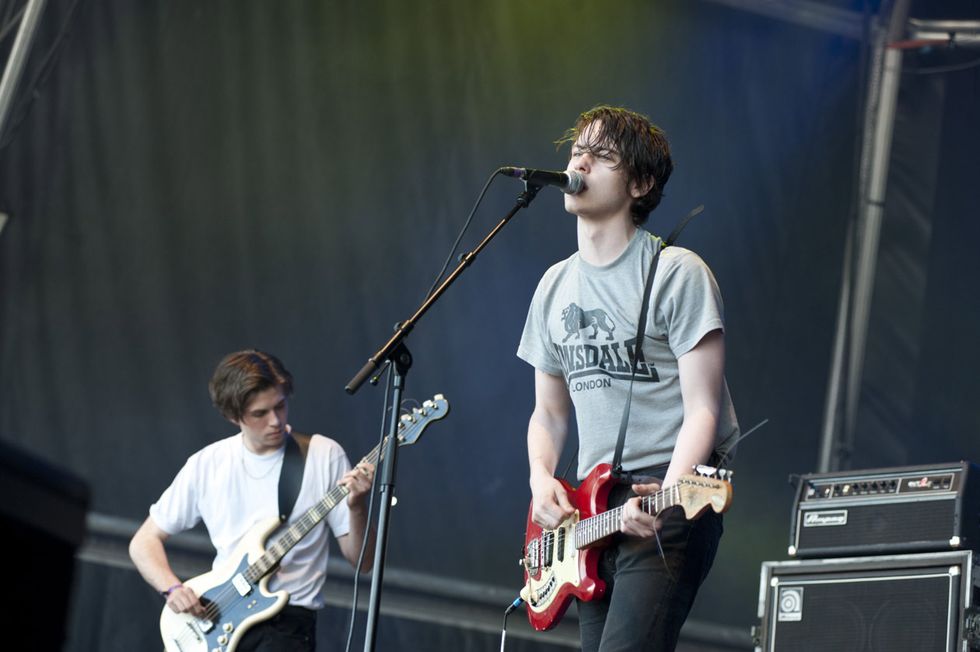

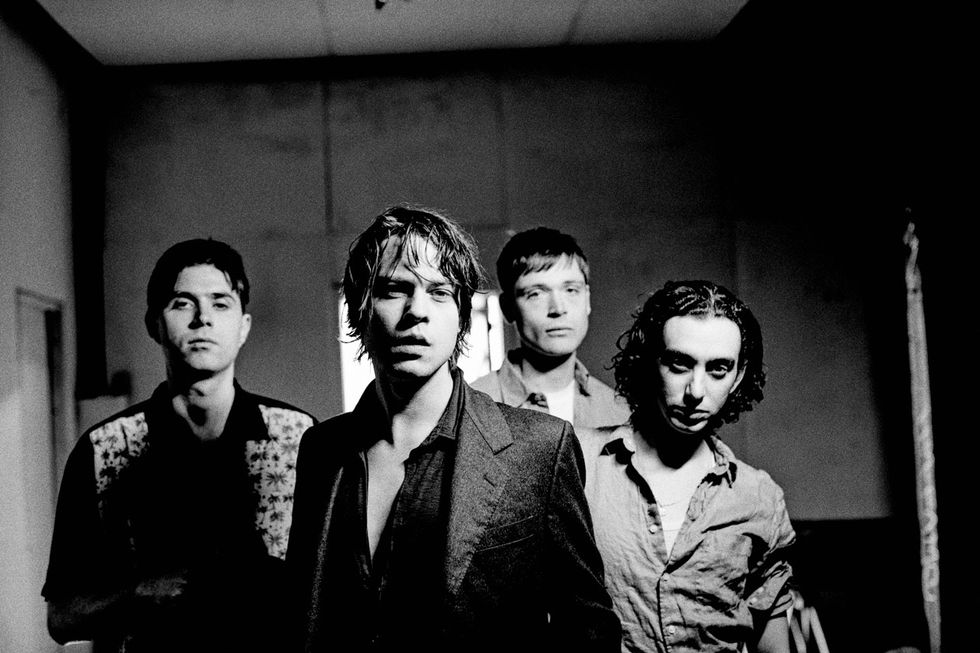







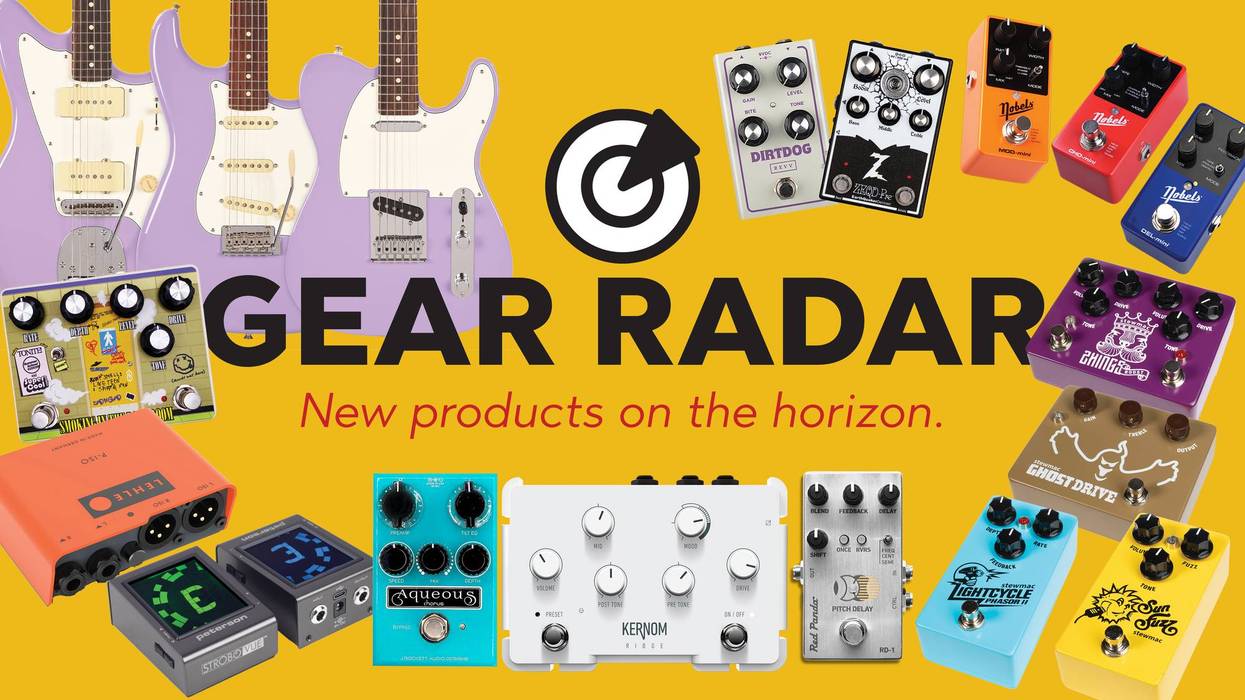



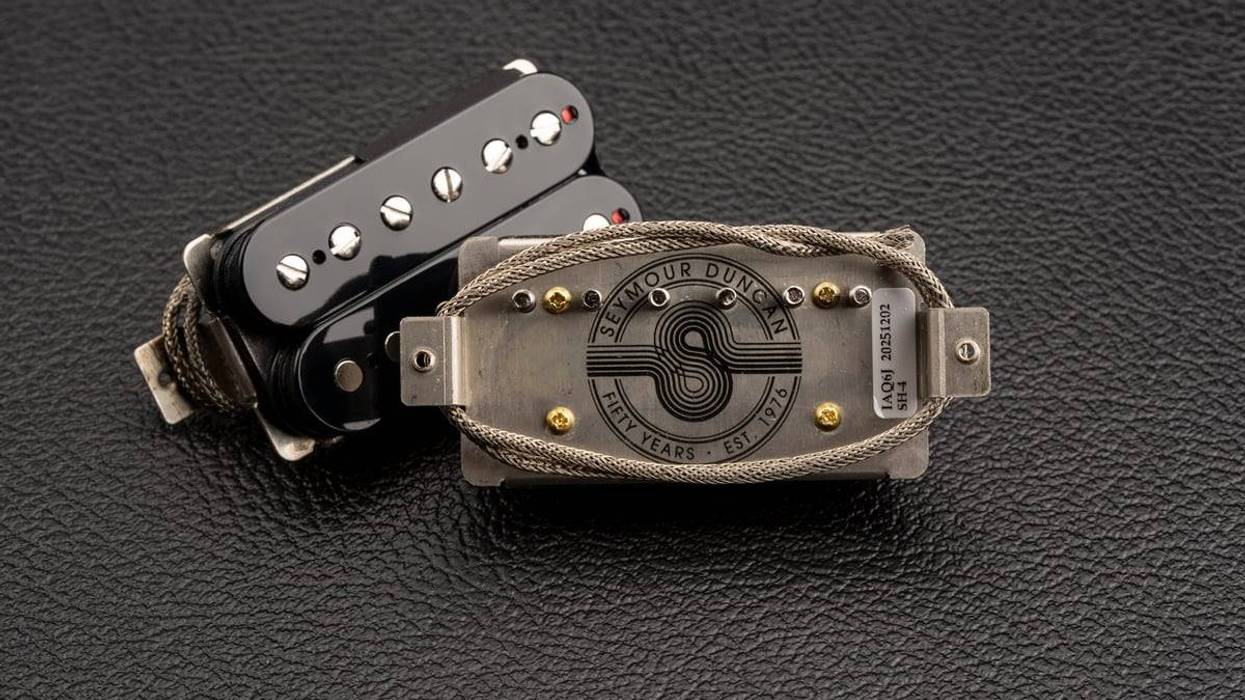


![Rig Rundown: Russian Circles’ Mike Sullivan [2025]](https://www.premierguitar.com/media-library/youtube.jpg?id=62303631&width=1245&height=700&quality=70&coordinates=0%2C0%2C0%2C0)
















![Rig Rundown: AFI [2025]](https://www.premierguitar.com/media-library/youtube.jpg?id=62064741&width=1245&height=700&quality=70&coordinates=0%2C0%2C0%2C0)











